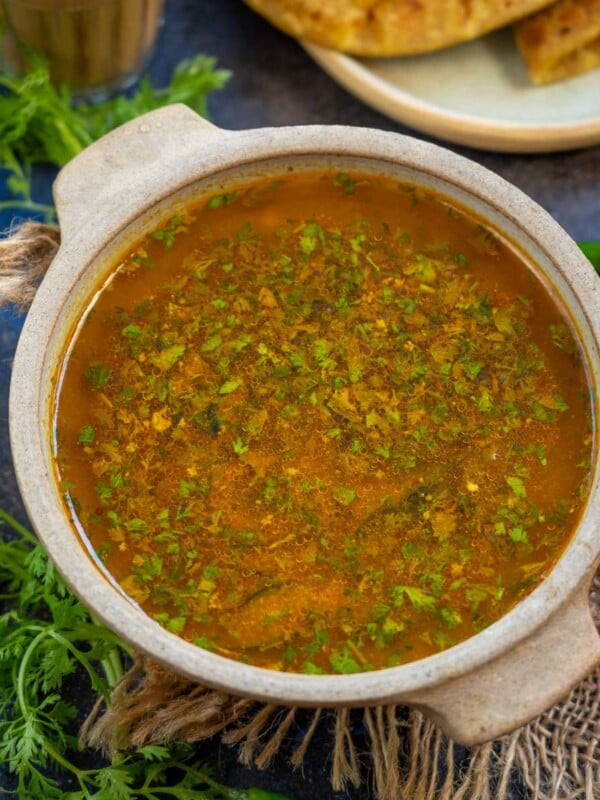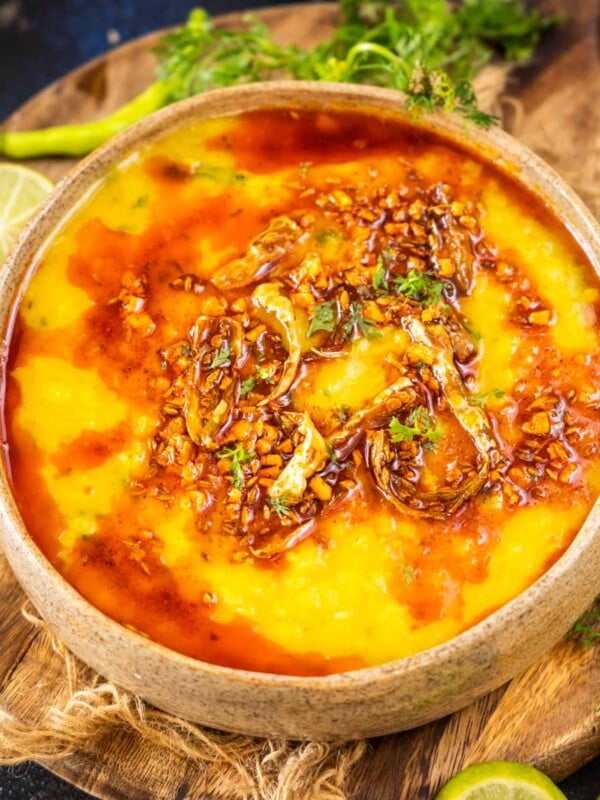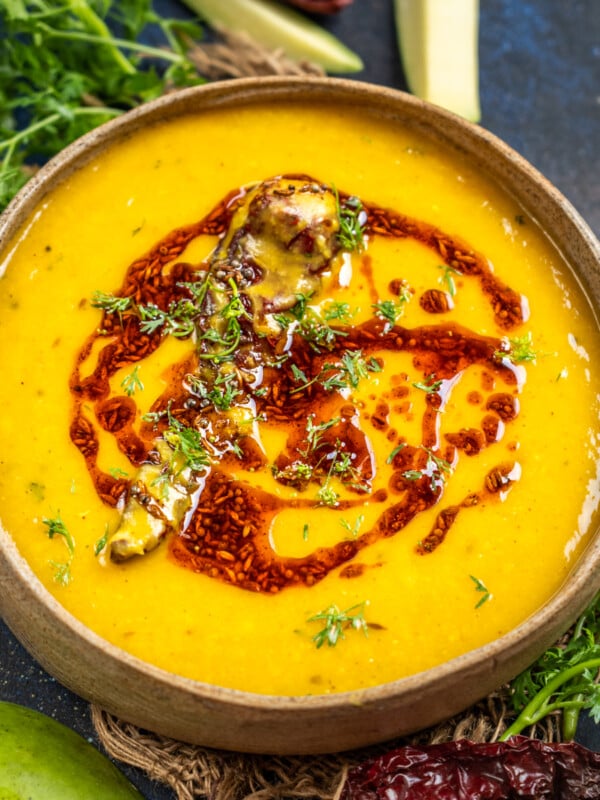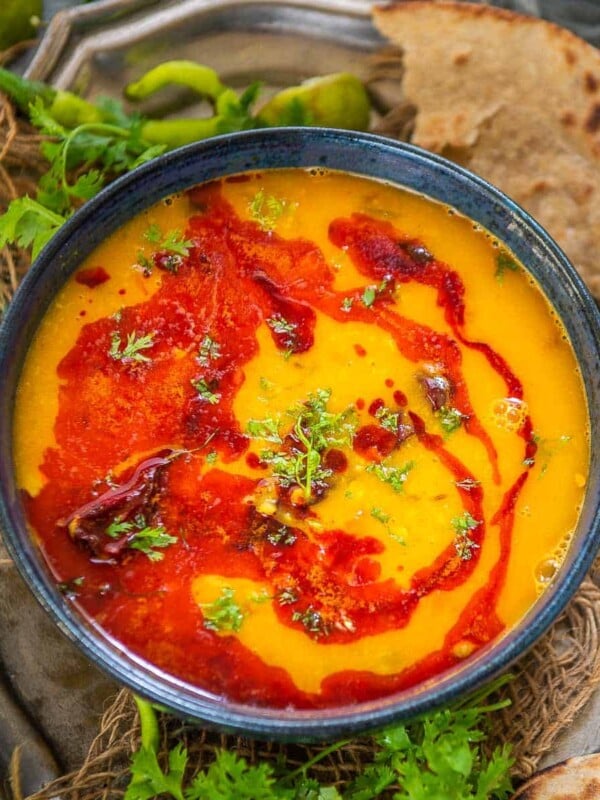on May 04, 2022, Updated Dec 27, 2023 Do try my Mullangi Sambar and Traditional Sambar.
About Kerala Sambar
Kerala Sambar is a tangy, spicy lentil recipe from Kerala (South India). It has freshly ground coconut paste added to it, hence the name. This recipe is easy to make and uses simple pantry ingredients. It is loaded with amazing flavors, and I assure you that you will be hooked once you sip this lentil curry. In Kerala households, this sambar is served with steamed rice and a dollop of ghee. It also tastes great with breakfast recipes such as idli, dosa, vada, or uttapam. It is also a must preperation for onam sadya and vishu sadya. You can cook the lentils in a traditional stovetop pressure cooker or an instant pot. I share both methods in the post below; choose the one that suits you best. I make this Kerala-style varutharacha sambar recipe in my 3-quart instant pot or 3.5-liter pressure cooker. You can scale the recipe but make it in bigger pots. The cooking time will remain the same. Veggies – You can add any vegetable to this recipe. I have added carrots, drumsticks, potatoes, brinjal, yellow pumpkin, and tomatoes, but you can also add cauliflower, white pumpkin, ladies finger, bottle gourd, snake gourd, French green beans, etc. This recipe is a great way to use up all the leftover veggies in your fridge. Tamarind – Tamarind pulp is used to add tanginess to the sambar. Others – You will also need turmeric powder, water, and salt.
For The Sambar Masala Paste
Kerala style Sambar is made using a freshly ground sambar masala paste prepared with coconut oil, Bengal gram (chana dal), split & skinned black lentils (white urad dal), fenugreek seeds (methi dana), whole coriander seeds, dry red chilies, asafetida (hing), onions, curry leaves, and fresh coconut. Avoid adding asafetida (hing) to make it gluten-free.
For The Tempering (Tadka)
Kerala sambar is tempered with a tadka of coconut oil, brown mustard seeds, dry red chilies, and curry leaves. Add the lentils to a 3-quart instant pot along with the following ingredients and stir gently.
4 cups of water 2 teaspoon salt 1 teaspoon turmeric powder
Press PRESSURE COOK and set the timer to 10 minutes at high pressure. Release the remaining pressure manually and open the lid. Mash the lentils with the back of a ladle. Note – To cook the lentils in a traditional pressure cooker, pressure cook (in a 3.5-4 liter cooker) for 1 whistle on high heat. Then, reduce the heat to low and cook for 10 minutes. Heat 3 tablespoon coconut oil in a pan over medium-high heat. Once the oil is hot, stirring frequently, add 2 teaspoon chana dal and 2 teaspoon white urad dal and fry until they turn golden brown. Add the flowing ingredients and cook for 2-3 minutes.
1 teaspoon fenugreek seeds 2 tablespoon whole coriander seeds 5-6 whole dry red chilies (stalks removed) ½ teaspoon asafetida 1 cup thinly sliced onions 15-20 curry leaves
Remove the pan from heat and let the masala cool to room temperature. Add the following veggies to the pot and mix well. Close the lid again.
4 cups of mixed vegetables (I used a mix of carrots, potatoes, brinjal, and yellow pumpkin, cut into ½-inch cubes) drumsticks (cut into 2-inch pieces) 1 cup of chopped tomatoes
Once the timer goes off, let the pressure release naturally for 10 minutes. Release the remaining pressure manually and open the lid. Add more water if the sambar is too thick for your liking. Check for salt and tamarind pulp, and add more if required. Note – If cooking the sambar in a traditional pressure cooker, then pressure cook for 3 whistles on high heat. Once the oil is hot, add the following ingredients and fry for 4-5 seconds.
1 teaspoon brown mustard seeds 3-4 whole dry red chilies 12-15 curry leaves
Pour the tempering over the sambhar and mix well. Serve hot with rice.
Katachi Amti
Malwa Dal
Raw Mango Dal (North Indian Style)
Punjabi Yellow Dal Tadka




























